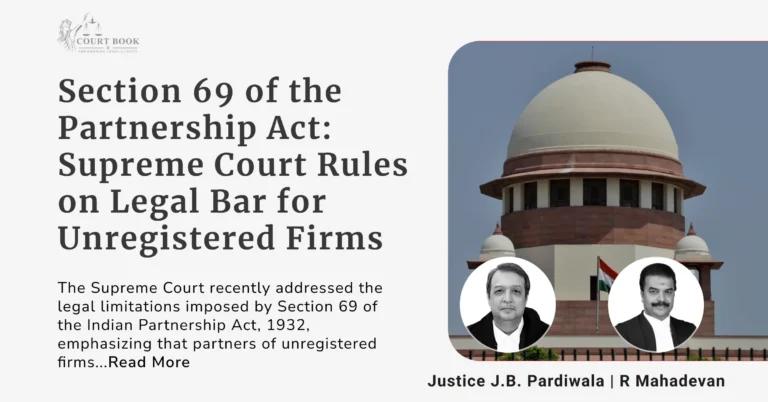The Supreme Court recently addressed the legal limitations imposed by Section 69 of the Indian Partnership Act, 1932, emphasizing that partners of unregistered firms are barred from filing suits to enforce contractual or statutory rights against other partners. This ruling clarifies the scope and applicability of Section 69 and highlights the importance of firm registration under Indian partnership law.
Understanding Section 69 of the Partnership Act
Restrictions on Suits Among Partners
Under Section 69(1), partners of an unregistered firm cannot file suits against each other to enforce rights arising from a contract. However, exceptions exist for cases involving:
- Dissolution of the partnership firm
- Rendition of accounts
- Recovery of property belonging to a dissolved firm
"Section 69(1) is mandatory, preventing suits unless they fall within specific exceptions provided under Section 69(3)," the Supreme Court clarified.
Restrictions on Suits Against Third Parties
Section 69(2) further bars unregistered firms from filing suits against third parties to enforce contractual rights. Any legal action within the purview of Section 69 becomes jurisdictionally invalid for unregistered firms.
Supreme Court Case: Sunkari Tirumala Rao & Ors. v. Penki Aruna Kumari
Case Overview
The petitioners, who were partners of an unregistered firm, filed a recovery suit for ₹30 lakh against another partner. The Andhra Pradesh High Court ruled the suit was not maintainable under Section 69, leading to an appeal in the Supreme Court.
Supreme Court's Rationale
Section 69’s Mandatory Nature
A Bench comprising Justice JB Pardiwala and Justice R Mahadevan reaffirmed that Section 69 imposes strict restrictions on legal actions by or between partners of unregistered firms.
"The jurisdictional bar under Section 69 ensures that unregistered firms cannot enforce contractual rights among partners, except in specific scenarios," the Court observed.
Alternatives to Recovery Suits
The Court noted that the petitioners could have filed a suit for:
- Dissolution of the partnership firm
- Rendition of accounts
These legal remedies are allowed under Section 69(3) and are not affected by the firm’s registration status.
Irrelevance of Business Commencement
The petitioners argued that the partnership business had not commenced, making their suit valid. However, the Court rejected this defense, ruling that the firm’s operational status does not exempt it from Section 69’s restrictions.
"Non-commencement of business does not negate the mandatory requirement for firm registration under the Act," the judgment emphasized.
Implications of the Ruling
- Enforcing Compliance with Registration
This ruling reinforces the importance of registering partnership firms to ensure legal recourse for disputes. - Limited Options for Unregistered Firms
Partners of unregistered firms are restricted to specific legal remedies, such as dissolution and accounts, preventing misuse of the legal system. - Guidance for Legal Practitioners
The judgment offers a clear framework for handling partnership disputes under the Act, ensuring adherence to legal provisions.
Conclusion
The Supreme Court's decision in Sunkari Tirumala Rao & Ors. v. Penki Aruna Kumari underscores the mandatory nature of Section 69 of the Indian Partnership Act, 1932. By affirming the jurisdictional bar for unregistered firms, the Court has provided a strong incentive for businesses to comply with registration requirements.
This judgment not only highlights the legal limitations for unregistered partnerships but also emphasizes the alternative remedies available under the law, ensuring clarity and fairness in resolving partnership disputes.













